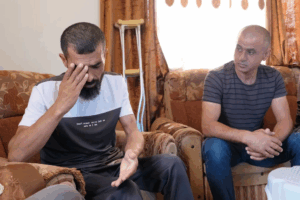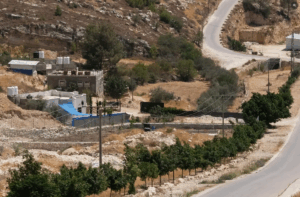First, settlers attacked the Palestinian home. Then the IDF joined in

Ali Hor (left) with his brother Abdullah, in Surif, July 2025. The family is now staying at the parents’ house, after leaving their own homes behind.
Gideon Levy reports in Haaretz on 18 July 2025:
Two men lie next to each other in two beds in a hospital, its telltale blue sheets visible in the photograph. In one bed is a wounded man, his face a study in pain; in the other is a man whose eyes are closed forever.
The two are brothers: Ali Hor is wounded and Mohammed is no longer among the living. Ali casts a sad glance at his brother. Both were shot last month by Israel Defense Forces soldiers and by settlers as they defended their home, which the latter were trying to set ablaze.
This act of terror, resulting in one death and one serious injury, was barely reported in Israel. Well, no Jews were hurt.
Later, in the pogrom in Sinjil, one of the two Palestinians who were killed was a U.S. citizen, so the event attracted a lot of international attention. There are no American passports in the village of Surif, where the Hor family lives: The victims of terror incidents there are nameless and no one is blamed for perpetrating the attacks.
All the men in the Hor family speak fluent Hebrew, having worked for years in Israel until the start of the war in the Gaza Strip.
“I grew up in Beit Shemesh,” the wounded brother, Ali, 42, told us when we visited his home this week, referring to a predominantly religious Jewish community outside Jerusalem that’s about a 45-minute drive away. Surif lies not far from the Green Line, northwest of Hebron; at one time its inhabitants could cross quite easily into Israel to work, but getting there now takes hours of navigating winding dirt roads and an endless array of army checkpoints. We drove there this week with two field researchers from the Israeli human rights organization B’Tselem: Manal al-Ja’bri and Nasser Nawaj’ah.
Surif is under partial siege. Its once-bustling streets are now desolate, like most of the Palestinian communities in the besieged West Bank. We met Ali and his family this week in his parents’ home, where they have been staying since the attack.
Ali, a father of seven, is groaning with pain. Stitches are spread across his stomach and he’s hooked up to a bag and a drain; his wounds are still bleeding. A bullet exploded in his gut and tore through his intestines. Still, he’s the luckier brother: Mohammed, who was 40 and the father of two, was shot dead, in the throat, by a settler.
No one has been arrested yet, of course, and it’s unlikely there will even be an investigation into the rampage a month ago. Why, what’s the deal? Here’s the deal. Ali: “They have robbed us of life and joy. Robbed us of the smile on our face. But I won’t remain silent. I will pursue them to every corner. They fled, but I will bring them to trial. I know that there is law in Israel. They destroyed my life. Never did I think I would find myself in this situation.

The Hor family’s home in Surif, July 2025
“Forty-two years I never spent a day in prison. I have friends in Beit Shemesh and in Jerusalem who are like family, I know more people in Beit Shemesh than I do in Surif – until we got into this situation because a few kids wanted to set our life on fire. Even if it takes 10 years I will get to them and bring them to trial.”
People in Beit Shemesh dubbed Ali, who earned a living doing renovations and sometimes even slept over in his clients’ homes, “the Muslim Jew.” Abdullah, his brother, who’s 46, is a gardener who worked for years in Modi’in and for five years was the gardener of Achva Academic College, in the southern town of Kiryat Malakhi. Two weeks after October 7, Ali was still in Israel, secretly, but he was caught and taken back to the West Bank; since then he hasn’t worked in Israel, like the rest of his family and his people.
About nine years ago, with three of his brothers, he purchased a plot of land and built four homes on it at the northern edge of Surif, not far from the notorious settlement of Bat Ayin, which has a proven terrorist record (see under: the “Bat Ayin underground”). The houses of the settlement aren’t visible from the Palestinians’ homes; they’re hidden behind ridges. But last month settlers’ tents started to crop up on the hill closest to the villagers’ homes, like they’re cropping up these days on virtually every hill in the West Bank.
It was a bad omen. The goal of the tent-dwellers is abundantly clear: to embitter the lives of the Palestinians and to terrorize them day and night, until they break under the strain and abandon their homes. In the time that’s passed since the incident, on Thursday, June 19, the members of the Hor family indeed abandoned their homes – but they intend to return to them soon and not to yield. “At first there was one tent,” Ali says. “Then there were two, now there are already maybe six.”
The tents were erected by settler youths on the slope of the hill above the Hors’ houses and also on the other side of the ridge. We saw only one blue one when we visited Surif this week, open and empty. The family says the settlers show up every afternoon and spend the night there, leaving in the morning.
One of them is usually armed and looks older than the others – maybe he’s a security guard who looks after them, the wounded man says, adding that it was that man who shot him. Since the day the teenagers put up their tents, they’ve been throwing stones at the residents’ homes. Around two months ago, some 20 masked youths massed outside the Palestinians’ homes in Surif, hurled stones at them from close range, and left. One resident suffered a head wound that required 14 stitches. His family didn’t bother filing a police complaint – they know it’s pointless.
A few days later, the youths set fire to some olive trees in the groves near Ali Hor’s house. The family points out that the settlers use highly flammable materials in their arson attacks, as we’ve already heard from other victims in the West Bank.
On the morning of that Thursday, a fire broke out in the cluster of settlers’ tents, its cause unclear. It was a scorching-hot day – “Hot like Jericho,” Ali recalls – and the flames spread toward Bat Ayin before it was extinguished by three Israeli fire trucks. Ali’s family suspects that the settlers held them responsible for the fire, for some reason.
On the day of the incident, Ali heard noise outside and saw flames from his window. He and his brothers Abdullah and Mohammed went outside and saw three masked youths not far away, holding white jerrycans, apparently determined to set fire to their homes. In short order the three invaders became a mob of 30, gathering on the slope of the hill above the brothers and other relatives who had gone out to protect their homes. The Palestinians thought that the group intended to seek revenge for the tent fire.
Meanwhile, Israel Defense Forces soldiers arrived on the scene and started shooting. Bullets ricocheted off the rocks. The Hors felt they were in mortal danger and withdrew to their homes; the settlers also dispersed.
About 40 minutes later, however, the settlers and soldiers returned. Ali says he and his family were deathly afraid; it was if a war was raging outside. More shots rang out. Ali’s 4-month-old baby girl and three young sons – a toddler of 2, and boys of 4 and 8 – were all crying and screaming.
“My children were in great danger,” he says now, adding that the soldiers did not even try to prevent the settlers from moving down the hill toward the house. Ali says he shouted to the officer, “Shame on all of you!” There was no response. A settler then drew close to the house with a jerrycan. It was clear that the structure, in which about 30 members of the extended Hor family were taking shelter at the time, was in serious danger.
Ali and Mohammed went outside and started to throw stones to rebuff the intruders who were descending the hill. They succeeded in driving off the settler with the jerrycan who was approaching but then the armed, older settler shot Mohammed. A bullet to the right side of the neck from a distance of 10 meters. As Ali leaped toward the shooter, the officer shot him in the left hip. Mohammed collapsed; Ali fell to the ground, bleeding. They lay a few meters from each other.
Some club-wielding settlers approached in order to beat Ali as he lay wounded, but were blocked by the soldiers. Ali crawled toward his brother, shouting, “Mohammed, wake up!” But in vain. He raised his bloodstained arm toward the house, to signal to his family that he had been wounded. Abdullah arrived to evacuate Ali, but he told him to take Mohammed first. More family members along with neighbors arrived on the scene. The settlers tried to stop Yusuf, the fourth brother, as he tried to pull Ali away. When the settlers heard that Mohammed had probably been killed, they quickly fled.
The two brothers, the living and the dead, were taken to the health clinic in Surif and from there to Princess Alia Governmental Hospital in Hebron, where fruitless attempts were made to revive Mohammed. Ali underwent three operations that same day to stabilize his condition. He remained in the hospital for two weeks.
On the same night of the terror attack the Hors fled.
The IDF Spokesperson’s Unit this week stated, in response to Haaretz’s query: “On June 19, 2025, a violent disturbance developed between Palestinian suspects and Israeli civilians near Bat Ayin, in [the territorial sector of] the Etzion Brigade. Upon receipt of the report, the security forces rushed to the point in order to allay the friction. When the forces reached that location, a number of terrorists threw stones and rocks at the troops, who responded by firing in order to remove the threat. Hits were observed.”
This week we went to see the abandoned homes at the bottom of the hill; we climbed up to the spot where Mohammed was shot to death and Ali was seriously wounded. Ali has equipped his house with bright security lights, almost like a military facility, to help ward off intruders. The hill is scorched from the fire. A chilling silence hovered in the air.
This article is reproduced in its entirety
